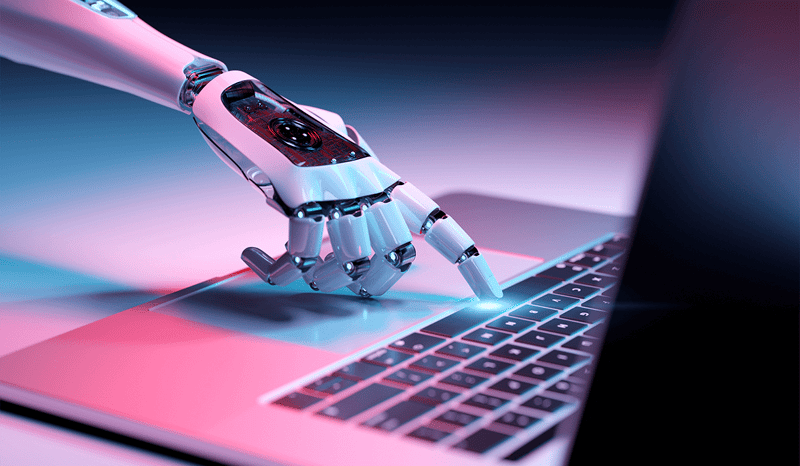
By John Suarez
In terms of worldwide impact across sectors, there are few cases comparable to the emergence of generative artificial intelligence (AI). Some arguable examples are the printing press, the steam engine, and the internet, considering their global impact.
Thanks to widespread media creation and access, consumers are more connected than ever. This interconnection causes monumental technological advances such as AI to touch practically every industry, department, and market around the world. Although certainly not a replacement for human-led interactions, individuals and entities are obligated to adapt to the prevalence of AI.
Companies that choose to appropriately embrace this technology are likely to improve and optimize countless processes within their organization. Below, we discuss some benefits of using artificial intelligence in marketing.
Artificial Intelligence: The Basics
Many of today’s technological developments leverage AI or some form of machine learning (we’ll get into this in a second). Some aren’t even aware that AI and machine learning are already behind many of the products and services we interact with on a daily basis. Whether you’re looking up driving directions, browsing your streaming service’s content recommendations, or simply scrolling your social media feed, a form of artificial intelligence is likely at work.
Often, artificial intelligence is used as a blanket term for computer systems that work beyond the limits of human perception. The term is also frequently used in conjunction with machine learning, which refers to algorithms that mimic human reasoning to learn and solve problems. Essentially, machine learning is a branch of AI, in the sense that “intelligent” programs will employ machine learning to develop and expand upon their intelligence without explicit programming or human instruction.
This brings us to generative AI. In short, generative AI turns machine learning data inputs into content for creative outputs (e.g., ChatGPT).
Use Cases for Artificial Intelligence in Marketing
Society is only starting to grasp the potential of generative AI and machine learning to streamline previously tedious or time-consuming tasks. In marketing alone, artificial intelligence is already capable of so much. A few examples include:
- Market research: Marketing departments can leverage AI for customer segmentation, personalized messaging, and predictive analytics.
- Social media listening: Tracking and recording important consumer data through social media activity
- Smart automation: Automating repetitive tasks such as categorizing data or (re)running keyword research
- Multilingual configurations: Quickly translating across language barriers and adapting to various cultural norms
- Data analysis: Automatically composing detailed analytics reports that reveal key performance insights
- Content generation: Developing written or visual content to meet deliverable requirements (read: audience needs)
AI Use Cases for Other Departments
Outside of marketing, any department that deals with large volumes of data and customer interactions can benefit from AI. Take the following operational examples, which only scratch the surface of generative AI’s optimization potential:
- Product research: Product departments can leverage AI for customer interviews, product sentiment analysis, and predictive analytics.
- Sales automation: Sales departments can use AI for lead scoring, demand forecasting, and prospect outreach.
- Customer support: Customer service teams can utilize AI-powered chatbots for efficient and personalized customer support.
- Payroll: With AI, accounting and HR departments can automate payroll and other repetitive processes using advanced data analysis.
Pros & Cons of AI Tools in Marketing
Advantages & Opportunities for Marketing Departments
Creatively valuable positions can’t be replaced by technology. However, there are major ways in which AI capabilities benefit marketers and other business professionals.
1. Real-Time Personalization
Generative AI enables marketers to deliver more personalized and impactful experiences to their customers with significantly less effort. Embracing AI can help generate ideas and provide data-driven insights, leading to more impactful and personalized content.
2. Task Automation
Many marketing tasks, mostly involving data collection and analysis, require tedious calculations, which can (and should) be automated using AI technology. A huge advantage of using AI in marketing is that it can process vast amounts of data at scale and speed, effectively freeing up human bandwidth.
3. Force Multiplication
AI can enhance and augment marketing efforts, just like GPS enhances our ability to get to our destination. AI-powered tools can uncover patterns, insights, and trends that might otherwise be overlooked. These powerful tools are not a replacement for human creativity or expertise, but they can help to enhance these qualities if used correctly and responsibly.
Disadvantages & Challenges
Despite its potential, AI in marketing also comes with several shortcomings. Here are a few core concerns to keep in mind when working with artificial intelligence in marketing.
1. Overreliance on AI
One significant disadvantage of using AI in marketing is the potential for overreliance on algorithms without human oversight. Though AI can automate certain tasks, marketers must maintain a balance between automation and human accountability. At the time of writing, one crucial question being asked right now is, “What happens when generative AI starts using its own outputs as inputs?”
2. Ethical Concerns & Bias
Transparency, privacy protection, creative infringement, and other ethical considerations are crucial when it comes to AI adoption in consumer-facing applications. For one, machines learn from the information that’s available to them—the good, the bad, and the ugly. If that data is skewed or biased, so is the consequent output, leading to potentially ill effects.
3. Adaptive Legislation
The moral, ethical, and safety-related grey areas associated with machine learning necessitate laws, rules, and established standards. And who should be responsible for setting such precedents? Companies? Countries? Legislation for new technologies is historically slow to adapt to such large technological advancements, and it is currently one of the primary question marks surrounding the governance of AI.
Developing a Marketing Strategy Using AI
Implementing machine learning for business operations doesn’t mean eliminating human interactions, supervision, or management. So how can marketers most effectively use AI to help develop and refine their marketing strategies?
To start, you need a clear understanding of your business and its objectives. From there, you’ll need some other informational building blocks, like an industry analysis, competitor info, and target audience detail. Use your favorite generative AI platform to compile a draft of all this information. Cross-check the data you receive from AI with your own research. Finally, re-insert that research into a new AI prompt, asking for a marketing strategy tailored to your business.
This is an oversimplification of leveraging AI to create a marketing strategy, but it’s a good place to begin your journey. I encourage you to test and iterate until you find an output that you like.
Foundationally, marketers can use AI tools to improve the precision and effectiveness of their campaigns in two steps. First, leverage AI to uncover new opportunities from the data you’ve already accumulated. Then, create and develop a data-backed marketing strategy with that information.
The Future of Generative Artificial Intelligence in Marketing and Beyond
The trick to unlocking efficiencies with generative AI is using these tools to enhance and amplify human efforts. In short: Embrace, don’t replace. AI technology isn’t a replacement for human efforts, even in highly technical positions. Embracing the vast potential of artificial intelligence in marketing or any other industry requires a flexible digital mindset and awareness of this technology’s capabilities, opportunities, challenges, and limitations.
Marketers have always leveraged modern technology and software tools to optimize and augment their work. Cameras didn’t make painters obsolete, just like Excel spreadsheets didn’t put accountants out of business. In this sense, large language models and other forms of AI are simply a more sophisticated addition to your tech stack.
Identify AI tools that can add efficiency to your business operations, and thoughtfully implement those tools with plenty of input from the humans who know your business best. That’s how marketers should think about leveraging AI moving forward.

About the author
John Suarez is a Director of Client Services with a successful track record in transforming, building, and growing business through creative and agile use of multichannel marketing campaigns. He puts honest and open communication first, focusing on data-led insights and stakeholder involvement to steer current and future growth strategies. Read more articles by John Suarez.






















